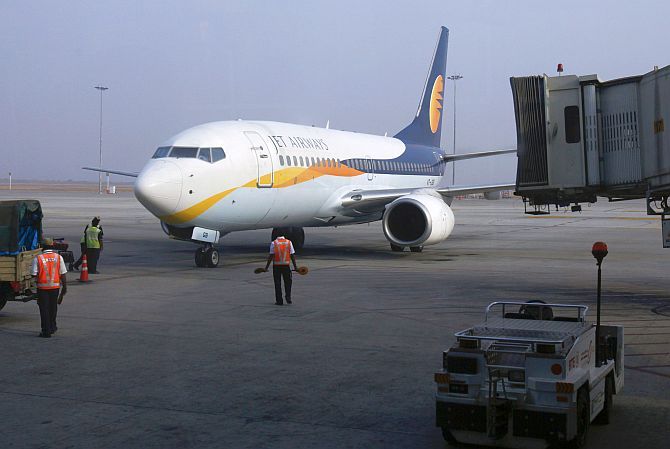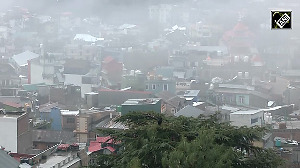The first hurdle is how long Jet Airways can enjoy rights over its parking slots at various airports.

The insolvency proceedings of Jet Airways have put the aviation industry in a spot as the sector’s regulator is grappling to cope with the grey areas in insolvency laws.
Jet’s is the first case where an airline is undergoing insolvency proceedings in India.
The first hurdle is how long Jet Airways can enjoy rights over its parking slots at various airports.
Jet Airways has 750 slots with more than 50 per cent of them at congested metro airports like Delhi, Mumbai and Bangalore which are considered to be prime attraction for the airline.
The resolution professional of Jet Airways Ashish Chhawchharia has asked the ministry of civil aviation to extend the right over slots till March 2020.
Under Section 14 of the insolvency code, a moratorium is levied on the recovery of any property by an owner or lessor where such property is occupied by or in possession of the corporate debtor.
“The resolution professional favours continuation of allotments to other airlines on an interim basis till March 2020 so that it can be freed up for Jet as and when it restarts operations,” a person aware of the development said.
But it has been learnt that the ministry is not amenable to the idea as it goes against the slot allocation guidelines.
“It’s very difficult to continue with temporary allocation of slots for airports and airlines.
"By October end, we should have a concrete idea on the chances of revival of Jet.
"The temporary thing can’t be for eternity.” said a senior ministry official.
The ministry in April had decided to reallocate Jet Airways' unused slots to other Indian airlines in order to normalise the situation as fares had skyrocketed due to the sudden collapse of the airline.
Last month, the government extended the time period and allowed airlines to use the slots till September 30.
But while allotting the slots, primacy was given to airlines which bring in additional aircraft.
This allowed SpiceJet to grab most of the slots as it was able to quickly deploy former Jet Airways Boeing 737 aircraft due to commonality of fleet.
“It was done till September 30 but for the upcoming winter schedule, the normal process should follow which should mean that airlines get to pick slots from the slot pool,” said a senior executive of IndiGo.
In the absence of clarity, airlines have been unable to give their winter schedule plan.
A senior official of a private airport operator said that slots ideally belong to airport operators and they should have the right to allocate them in discussion with airlines.
“The government stepping in to allocate slots was a breach of its powers,” he said.
The official said that slot allocation should normally be done by the slot allocation committee of airports and the government has no role to play.
But due to the unprecedented situation, the government was forced to make rules in order to control the rising air fares.
Similarly, India is a signatory to the Cape Town Convention, which gives primacy to aircraft lessors to get their assets.
However, it is in conflict with India’s insolvency laws which put a moratorium over all assets once they are registered with the National Company Law Tribunal (NCLT).
Recently a Dutch company had moved aviation regulator Directorate General of Civil Aviation (DGCA) asking it to deregister a Boeing 777 aircraft which the firm had seized to recover dues from the airline.
While the request was rejected as the company had not followed the proper deregistration procedure, DGCA officials were also puzzled as India is a signatory to Cape Town convention.
“The draft Bill on Cape Town Convention Act 2018 contains a provision that will accord primacy to the provisions of the Convention/Protocol in case of conflict with any other law.
"If we have to follow that, the insolvency rules will be discredited,” said a senior official.
The Bill will be implemented only after it is ratified by Parliament.
Photograph: Vivek Prakash/Reuters












 © 2025
© 2025